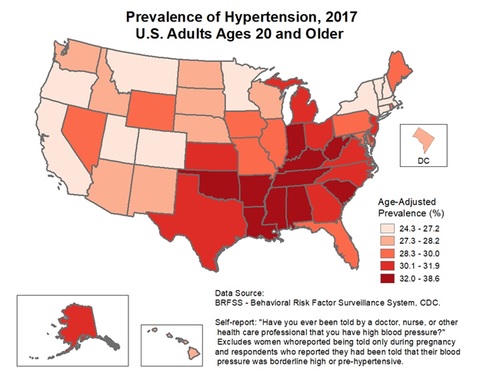What is hypertension (high blood pressure)?
Definition:
| Blood pressure category | Systolic Blood Pressure (Top blood pressure reading) | Diastolic Blood Pressure (Bottom blood pressure reading) | |
|---|---|---|---|
| Normal | <120 mmHg | And | <80mmHg |
| Elevated | 120-129mmHg | And | <80mmHg |
| Hypertension | |||
| Stage-1 | 130-139mmHg | Or | 80-89mmHg |
| Stage-2 | ≥140mmHg | Or | ≥90mmHg |
NB: if upper blood pressure goes above 180 and/or lower blood pressure goes above 110, please seek urgent medical care despite absence of symptoms.
Why is it important to know about hypertension?
Hypertension is a one of the major health conditions with significant morbidity and mortality. It puts
you at high risk for heart disease and stroke which are the leading cause of death in the United States.
Below is an important data:
Number of Adults aged ≥20 with hypertension=49.6%
Death in adult patients= 11.1 deaths per 100,000 population
Physician office visit with diagnosis of hypertension: 32.8 million visit per year
Emergency department visit with hypertension=1.1 million visit per year

What is hypotension (low pressure pressure)? Is low blood pressure of any concern?
High blood pressure as well low blood pressure is dangerous. When systolic blood pressure drops <90 mmHg, it is called hypotension. The common symptoms are dizziness, palpitations, sweating, chest pain, or passing out (syncope). Low blood pressure could be fatal based on other comorbid conditions. It is important to check blood pressure if you experience these symptoms and discuss with our team if any medication need to be modified or further tests need to be done to figure out the specific reason that dropped your blood pressure to symptomatic level.
What causes hypertension?
The most common causes of the hypertension are mentioned below:
- Kidney diseases
- Adrenal gland diseases
- Obstructive sleep apnea
- Neurogenic causes mean nervous system related diseases.
- Thyroid diseases
- Hormonal disturbances
- Medications such as steroids, NSAIDS, cocaine, decongestants, etc.
What are the ways I can prevent hypertension?
The most important thing to understand about hypertension is that you can prevent it by living a healthy lifestyle by keeping the blood pressure in a healthy range. Following are the ways:
- Eating a healthy diet including a DASH diet.
- Keeping you weight within a healthy range specific for your age and BMI.
- Do not smoke cigarette!
- Be physically active as much as possible.
- Alcohol intake in moderation
- Adequate sleep every day
Our team can guide a motivated patient to adopt certain lifestyle changes and
assess the improvement in short term (3 months) and long term (>6month).
We provide appropriate blood pressure screening guidelines for certain patients and even healthy
individuals to diagnose hypertension early on and work in a direction to prevent long term complications
of uncontrolled high blood pressure.
What are different ways I can control hypertension?
Once you have been diagnosed with hypertension, it becomes important to make a treatment plan that works for you. Our team will help you achieve that target blood pressure and prevent the long-term complications. Blood pressure monitoring at home is an important aspect which help your doctor adjust your medication and have a better control. Keep a blood pressure monitor at home with appropriate size cuff that works for you for home monitoring. Not every medication works for every patient. Therefore, our team takes patient centered approach to find the right medication that works for them. We can help build up a plan how to take medications minimizing side effects and customize the diet plan for our patient.
What are the complications of untreated or uncontrolled hypertension?
Blood pressure if remains undiagnosed or uncontrolled for many months or years
could lead to multiple complications that can affect daily life.
Common complication are:
- Heart attack
- Stroke
- Leg vessel damage
- Eyesight damage
- Kidney damage, etc.

